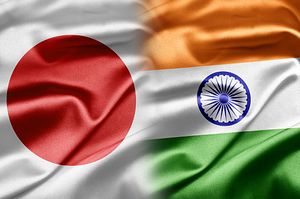In an essay titled Bourgeois and the Samurai written between 1906 and 1907, Sri Aurobindo lamented that of the two nations to have come under strong European influence, Japan had become one of the mightiest powers in the world, whilst India had squandered its great past to end up weak and dependent. Indian Nationalists have long been united in their admiration for Japan, both before the Second World War and after, marvelling subsequently at Japan’s postwar mobilization and reconstruction effort. Little surprise then, that with the right-wing nationalist Bhartiya Janata Party (BJP) favourite to lead a coalition and form India’s next national government under Narendra Modi in a month’s time, analysts are making a case for what could be the defining Asian strategic partnership of the 21st century.
India-Japan relations have strengthened consistently, since diplomatic relations were first established in 1952. In the 1990s, with the opening up of the Indian economy, the end of the Cold War and the beginning of India’s “Look East” policy, Japan and India had new opportunities to forge closer ties. The initial beneficiary of this was business. Today, Japan is India’s largest aid donor and India is the largest recipient of Japanese Official Development Assistance (ODA). Bilateral trade between the two countries has nearly tripled in recent years, from $6.5 billion in 2005-06 to $18.43 billion in 2011-12 and retains huge potential for growth.
In 2006 however, with the declaration of the Japan-India Global and Strategic Partnership, the nature of the relationship began to change. Ties were not just strengthening but were crossing new frontiers as Japan and India started to unmistakeably identify each other as a strategic partner, both wary of Chinese power and looking to assert their role in Asia. Today, Japan is the only country in the world aside from Russia, with which India holds a bilateral annual strategic dialogue. It is in the process of negotiating the purchase of 15 amphibious aircraft from Japan in what would be Japan’s first sale of military hardware since 1967 and has invited Japan to join the Indo-US Malabar naval exercises this year, the first time since such an endeavour in 2007 attracted formal protests from China. Even the nuclear issue, so often a ceiling to ambitions for closer relations, shows signs of slowly receding with negotiations on a civilian nuclear deal – unthinkable in the early 2000s after India’s Nuclear Weapons tests in 1998 – continuing to progress.
The BJP-led National Democratic Alliance (NDA) coalition is likely to continue to build on the new landscape provided by the Congress-led United Progressive Alliance (UPA) in the last decade, but expecting as some political commentators do today that the well-documented Modi-Abe friendship, which goes back to 2007, and their shared nationalist, conservative credentials to deliver a tremendous uplift to the Indo-Japanese relationship is perhaps overreaching. The fact remains that India has been at pains to consistently assert that the India-Japan partnership is no strategic threat to China, and will always remain under pressure to demonstrate that. Moreover, cautious quietism remains central to Indian foreign policy thinking. Indian foreign policy also changes minimally from government to government, the “Look East” policy that began in 1991 for example was vigorously followed by the NDA in its first stint in power (1998 – 2004) and then by the UPA in the subsequent decade. Even the upswing in India-Japan relations, a hallmark of Manmohan Singh’s UPA government in the last decade, was only possible because of the initiatives started by the Vajpayee led NDA in 2000.
Modi will certainly build on his personal connections with the Japanese business community, cemented during his tenure as Chief Minister of Gujarat, to further Japanese investment in Indian infrastructure and continue to pursue the strategic partnership that has gained momentum in the previous decade. That he and Abe might share a common weltanschauung might help and expedite initiatives, but always remains second to regional security imperatives for both countries that are shaped by China.
Lastly, while India has much to gain from Japan both in terms of developmental aid, military and civilian technology and a strategic alliance, Japan will slowly want to up the pressure for Indian support on crucial issues such as the Senkaku/Diaoyu islands, which India has thus far been reluctant to spell out. Though India’s well known reticence in world affairs may have been grudgingly accepted so far by its partners as the country pursues its many domestic exigencies, in the coming years any strategic partner of India will want to see an active, engaged and willing nation. How far a prospective government under Narendra Modi is willing to buck the trend and reorient Indian foreign policy thinking, in pursuit of its promised developmental agenda, will be interesting to see.
Aniruddh Mohan is a Research Intern at the Institute for Defense Studies and Analyses in New Delhi, India and a graduate of the University of Cambridge with an MPhil in Nuclear Energy.

































